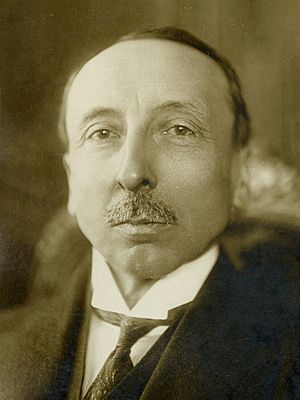Léon Bérard facts for kids
Léon Bérard (born January 6, 1876, died February 24, 1960) was an important French politician and lawyer. He was born in Sauveterre-de-Béarn and passed away in Saint-Étienne.
Bérard held several key government jobs in France. He served as the Minister of Public Instruction (which is like the Minister of Education) in 1919 and again from 1921 to 1924. Later, he became the Minister of Justice from 1931 to 1932. In 1934, he was chosen to be a member of the Académie française, a very respected group that protects the French language. During World War II, from 1940 to 1945, he was the Ambassador for Vichy France to the Holy See (the government of the Catholic Church).
Contents
Bérard and the Spanish Civil War
As a Senator, Léon Bérard played a role in the final stages of the Spanish Civil War. In February 1939, Édouard Daladier, the French Prime Minister, asked Bérard to travel to Burgos. Burgos was then controlled by the Spanish Nationalists.
The Spanish Civil War was almost over, and the Nationalists were winning. France had previously supported the other side, the Spanish Republicans. However, France now needed to make agreements with the winning Nationalist government. This was especially important because over 400,000 refugees from the Catalonia region of Spain had fled into southern France since early 1939.
The Bérard-Jordana Agreement
The discussions led to a treaty called the Bérard-Jordana Agreement. This agreement was signed on February 25, 1939. By signing it, France officially recognized the Nationalist government of Francoist Spain. Soon after, other major countries like the United Kingdom (on February 27) and the United States (on April 7) also recognized Franco's government. Philippe Pétain then became the French ambassador to Spain and helped put the treaty into action. Bérard was also given the Order of the White Eagle for his work.
Why Bérard Opposed Esperanto
Léon Bérard was strongly against Esperanto, which is a language created to be used internationally. He believed Esperanto was a tool for "Internationalism," a political idea that promotes cooperation among countries rather than focusing on national interests. He also worried that Esperanto could become a rival to French as an important language for diplomacy (talking between countries).
As the Minister of Public Instruction, Bérard took action. He banned the teaching or promotion of Esperanto in public schools across France. He also played a big part in stopping a proposal at the League of Nations (an international organization before the United Nations) that wanted to make Esperanto an official international language. The proposal was rejected, partly due to Bérard's efforts.
See also
 In Spanish: Léon Bérard para niños
In Spanish: Léon Bérard para niños
 | Precious Adams |
 | Lauren Anderson |
 | Janet Collins |


